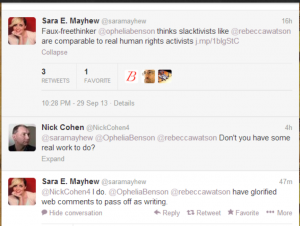First published in India’s Frontline magazine; reposted here by permission.
Asaram Bapu’s alleged sexual assault on a young girl offers an opportunity to throw light on India’s superstition industry and lift the veil on the state-temple-corporate complex. By MEERA NANDA
At one level, the arrest of Asaram is a rather humdrum, same-old story. One more godman has fallen from grace. So, what is new under the sun? Aren’t we used to discovering the clay feet of our sadhu sants? Perhaps George Orwell was on to something when he said that “saints should always be judged guilty until they are proved innocent”, for no all-too-human godman can ever live up to the qualities of godliness. Perhaps the wise course to take is to reflect upon the tragedy of overweening human ambition of these fallen gurus and move on.
Yet, if one pauses to think about it, Asaram’s arrest is not just a matter of one more godman’s personal failings. Rather, this episode dramatises the thin line between faith and blind faith, and the near complete merger of faith, politics and money in contemporary Indian society.
Asaram’s alleged rape of a 16-year-old girl is proof—if more proof is needed—why Narendra Dabholkar’s struggle against superstitious beliefs and practices is indeed the need of the hour. The young girl was brought to the guru for an exorcism, of all things. From the revelations that are trickling in, it appears that this girl and her parents were made to believe by Asaram’s associates that she had been possessed by evil spirits which the guru had the ability to drive out. This kind of andh shraddha, or blind faith, which our godmen so routinely encourage and exploit, is precisely what Dabholkar and his Maharashtra Andhshraddha Nirmulan Samiti were fighting against, a fight that cost him his life.
Asaram’s case is also proof—if more proof is needed—that a state-temple-corporate complex is always and everywhere at work in India. Most of the times, it lies hidden in plain sight: we are so used to the sight of our elected representatives and the pillars of civil society—from prominent scientists, business tycoons to Bollywood superstars—prostrating themselves before gods and godmen that we do not notice how smoothly faith, politics and money blend into one another. It is when the godmen behave badly (as in Asaram’s case), or when they fall foul of the powers-that-be (as happened to Baba Ramdev after his anti-corruption rally last year), that the veil is lifted. It is on occasions like these that we see what has been lying under our noses all along, namely, the state-temple-corporate complex.
Narendra Modi and other political leaders may want to distance themselves from the fallen godman for strategic reasons. But it is no secret that Asaram was treated as the de facto rajguru in Gujarat under both BJP and Congress governments. Indeed, when you examine the record closely, it is clear that Asaram’s hugely profitable empire of ashrams, gurukuls and schools was built up with the largesse of land given by the state as grant (which he later expanded through encroachment) and as private donations from the wealthy Sindhi-Marwari community. His political connections created a protective shield around him, immunising him from many allegations of crimes (including murder of children) and misdemeanours. The godman could literally get away with murder. Asaram, of course, is hardly alone in using his political clout to amass a fortune. Behind every successful godman in India today stands a cluster of powerful politicos with free access to the public assets and the machinery of the state. Once launched, the successful gurus build business empires, which attract other corporate interests, especially those with interests in the burgeoning market in education and tourism.
Under the neoliberal regime that India put in place to attract private capital, both global and indigenous, it has become easier than ever before to funnel public money and public assets into religion-cum-business empires. Often all that is needed is an authorisation for a change in land use (from agricultural to institutional or commercial) and the University Grants Commission (UGC) or the State legislature conferring the status of a “university” on a teaching shop set up by a guru’s trust under the pretext of imparting “value-based” education. The neoliberal mantra of public-private partnerships has benefited religious entrepreneurs as much as any other corporate interests. The difference is that the aura of holiness and the layers of shraddha and andh shraddha protect the former from any serious inquiry, let alone a challenge.
Until recently, State governments, especially in BJP-led States, were falling over each other to offer public land to Swami Ramdev to set up subsidiaries of Patanjali Yogpeeth, his flagship ashram-cum-ayurvedic hospital in Haridwar, Uttarakhand. Uttarakhand conferred the status of a “university” on Ramdev’s ashram and Haryana recognised the gurukul set up by the baba. These are fee-charging, for-profit teaching shops, not charities, though perhaps they get tax-breaks as charities. Ramdev’s government-sponsored ayurvedic formulary has made millions selling drugs of dubious safety and efficacy, while Aastha, the TV channel he owns through his proxies, has raked in huge profits. In their take-off stage, these businesses were, in part, subsidised by wealthy donors in India and abroad. Once the physical assets are in place, subsidiary government agencies and corporate interests step in to develop infrastructure such as roads, hotels and resorts and run luxury buses.
This triangular relationship between the state, the peddlers of “ancient values” of Hindu sanskriti and private money has become the standard operating model adopted by nearly all brandname gurus. It makes no difference if the State in question is “secular”, as States ruled by the Congress and the various regional parties claim to be, or is allied with the Hindu nationalists.
Ashram on leased land
Take, for example, the case of Sri Sri Ravi Shankar, who has constructed the headquarters of his Art of Living (AOL) ashram on land leased to him for 99 years by the State of Karnataka. The corporate support of AOL from Infosys and other Bangalore-based software companies is well known. But, wait, there is more: AOL got a land grant of 200 acres (one acre is 0.4 hectare) from the State of Odisha, where a new university offering “modern teaching with ancient values” started operations last year. The same business model was adopted by Madhya Pradesh, which honoured its native son, Maharishi Mahesh Yogi, with a land-grant university. (My book, The God Market, provides evidence of the extensive state involvement in these cases, as it does for Baba Ramdev as well. I have only gathered the publicly available evidence and connected the dots between the active partners involved—the gurus and their political and corporate backers.)
Such state subsidies to gurus are over and above the direct subsidies many State governments provide for paying the salaries of temple priests, covering the cost of temple renovation, conducting pujas on behalf of those who cannot afford them, and setting up Vedic pathshalas, where students learn karma kanda, or priest craft. Perhaps the biggest indirect subsidy temples get from the state is through tourism. New “pilgrimage circuits” are created by States with grants from the Central government. Indeed, it is not uncommon for State tourism departments, in collusion with temple management committees, to invent prachin itithas (ancient history) for the temples they want to promote, to sponsor cultural traditions associated with religious festivals (the spate of state-sponsored Navratri and Makar Sankranti celebrations in Gujarat and Himachal Pradesh, for example) or to invent brand new traditions altogether (the golden cart processions in the Meenakshi temple in Madurai, the staging of the “celestial” lights in the Sabarimala temple in Kerala, for example).
The open diversion of public funds and assets into religious institutions of Hindus (and of minority faiths as well, depending upon political calculations) is bad enough. But the damage the collusion of state and religions does to the cultural habitat of civil society cannot be measured in rupees alone. The state-temple-corporate complex is grounded in the shared belief in gods and a shared blind faith in gods’ sales representatives here on the earth.
Faith-based nexus
When our elected representatives, policymakers and state functionaries approach the religious establishment as devotees, rather than as officials of a secular state with a constitutional mandate to create a secular public culture, what we get is a culture seeped in a disregard for the law, and a culture that protects irrational beliefs from critical scrutiny.
Take the case of the senior police officer D.G. Vanzara, charged with staging fake encounters in Gujarat. One of such encounters took the life of Ishrat Jahan, 19, and three others. In a letter of resignation written from Sabarmati Central Prison where he is lodged, Vanzara declared Narendra Modi to be his “God” and none other than Asaram to be his “guru”. It appears that his resignation was provoked by the fact that his “God” failed to protect his “guru”. The close entanglement of a law enforcement officer with the Hindu nationalist agenda of Modi on the one hand and with the godman on the other is obvious. The irony is that the “spirituality” he got from his guru was uncontaminated by any ethical considerations against killing innocents in fake encounters. It is indeed sobering to think how many Vanzara-type law enforcers are out there who revere Asaram-type gurus who openly prey upon their devotees. As long as this faith-based nexus is in place, what hope can one reasonably have that lawbreakers will be punished and justice will be done, at least in those cases where the godmen themselves are implicated in the crimes being investigated?
Even more damaging is the state protection that irrational beliefs and damaging religious practices get when the powers that be approach religious authorities on bent knees and with folded hands. A case in point is Lalu Prasad’s recent visit to the ashram of the ‘tantric’ Vibhuti Narayan aka Pagla Baba in Uttar Pradesh’s Mirzapur district, where he conducted a fairly elaborate prayer.
It is well known that many of the tantric beliefs involve paranormal and occult powers for which there is no scientific evidence whatsoever. Indeed, the bhuta pretas that Asaram was promising to exorcise from the young girl he is alleged to have raped are very much a part of the tantric belief system. So ask yourself this question: will Lalu Prasad use his political clout to promote his “god” or will he promote values of critical thinking which question the existence of bhuta preta? We all know the answer.
A law against superstition?
What is to be done? Can a law against superstition—the kind that Dabholkar and his associates fought so long and hard for—help? Could such a law have prevented the latest horror story that is reported to have taken place in Asaram’s ashram?
Crimes like rape and murder, of course, do not need any new laws. They only require a more stringent and thorough prosecution of the alleged criminals without the fear of god-like powers of either the godmen or their political godfathers.
But what if there were to be a law that prevents any public discourses, advertisements and/or demonstrations by anyone, regardless of which faith or tradition he/she belonged to, about their ability to expel evil spirits, or to bring about miracles that defy all the known laws of physics and biology, or to provide cures for diseases with no known cures as yet? Imagine also that such a law were enacted at the national level, with each State mandated to put it into practice. Let us also imagine—highly improbable though it is—that this law is applied stringently and with no fear or favour. (Our hypothetical law is modelled after the law that had been pending in the Maharashtra State legislature for many years, and was passed as an ordinance following the murder of Dabholkar.)
Could such a law have prevented the rape and other crimes that allegedly happened in Asaram’s ashram?
The answer has to be a qualified “yes”. Such a law could have prevented someone like Asaram from claiming god-like abilities in the first place. It would not, of course, make crimes disappear, as most rapes and murders do not require the cover of faith. But such a law would make it harder for faith to provide cover for crimes, frauds and other misdemeanours.
Even more important, such a law can prevent the corruption of the public discourse that goes on day and night when alleged godmen instil blind faith in occult powers and phenomena that are entirely without any basis in the facts of nature as we know them.
Will such a law deprive people of their constitutional right to freely practice the faith of their choice, as the civil libertarians fear? Is a law against superstition really a law against religion itself, as the conservative forces aligned against Dabholkar’s initiative have asserted?
The right to believe and practise one’s faith is a precious right that must not be infringed upon. On that there is no debate whatsoever. But the question really is this: does the freedom of religion include the freedom to profess, encourage and profit from superstition? Where does religion end and superstition begin? Or, are the conservative critics of an anti-superstition Bill right in assuming that religion cannot exist without superstition?
Those who fear that such a law will deprive Indian citizens of their freedom of conscience and free profession and practice of religion ought to read the Constitution carefully. Freedom of religion in the Constitution is subordinate to the Fundamental Rights of citizens. That means the state reserves the right to regulate or restrict any “economic, financial, political or other secular activity that may be associated with religious practice” if that activity can be shown to contradict “the norms of public order, morality, health and other provisions of this Part” (“this Part” refers to Part III of the Constitution which enumerates the Fundamental Rights of citizens). One would think that curing someone of mental stress falsely attributed to possession by evil spirits, as Asaram was claiming to do, legitimately constitutes a “secular activity associated with religious practice”. There is no reason why the state cannot regulate it in the interest of protecting people’s fundamental interests in life and liberty.
Under the Constitution, the Indian state not only has the authority, but is in fact duty-bound, to curb those secular activities associated with religious practices that it deems contrary to the other fundamental rights of the citizens. Cultivation of a scientific temper, humanism and the spirit of inquiry and reform is indeed one of the Fundamental Duties of every citizen of India, as enshrined in Article 51A (h) of the Constitution inserted by the Constitution 42nd Amendment during the Emergency in 1977. The Supreme Court has, in a few cases, accepted the principle that as these duties are obligatory on citizens, the State should also observe them.
Those who find the prospect of such regulation an unbearable restriction on their faith have some soul-searching to do. Is their faith so fragile that it stands or falls with irrational, superstitious and harmful practices? Is it not the duty of those who claim to uphold the faith to see to it that their faith tradition cleanses itself of outmoded beliefs and irrational ways of knowing?
All said and done, there is nothing more important than to carry on with the struggle against blind faith that Dabholkar gave his life for. Commitment to a scientific temper and critical thinking is the only weapon we have against the peddlers of blind faith and their political enablers.
Meera Nanda specialises in the history of modern science. Her most recent book is The God Market: How Globalization is Making India more Hindu, published by Random House in India (2009), Monthly Review Press in the United States (2011).
(This is a syndicated post. Read the original at FreeThoughtBlogs.)







